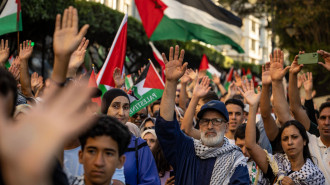Egypt security forces used French arms in Rabaa massacre, Amnesty finds
Egypt security forces used French arms in Rabaa massacre, Amnesty finds
Amnesty International called on France to stop supplying arms to Egypt after analysis showed French weapons were used in the country's deadliest crackdowns.
3 min read
French equipment was used during Egypt's deadliest crackdowns (Getty)
Arms supplied by France were used with deadly effect by the Egyptian security forces to violently and repeatedly disperse protests and crush dissent, Amnesty International has claimed in a new report.
The report Egypt: How French Arms Were Used to Crush Dissent based on video footage and photographs, says evidence clearly shows French suppplied Sherpas and MIDS vechiles being used during some of the bloodiest incidents of internal repression.
"It is appalling that France has continued to provide Egypt with military equipment after it was used in one of the most deadly assaults on protesters witnessed anywhere in the 21st century," said Najia Bounaim, North Africa Campaigns Director at Amnesty International.
"The fact that these transfers were made – and continued to be made – even though the Egyptian authorities have taken zero steps towards accountability and have failed to introduce any measures to signal an end to their pattern of abuses, puts France at risk of complicity in the ongoing human rights crisis in Egypt."
Between 2012 and 2016 France supplied more arms to Egypt than it had in the previous 20 years; and in 2017 alone it delivered more than 1.4 billion euros worth of military and security equipment to Egypt, Amnesty's report said.
On 14 August 2013 French-supplied Sherpa armoured vehicles were used in Cairo by Egyptian security forces to disperse sit-ins across the city. In what is now known as the Rabaa and Nahda massacres, the Egyptian security forces killed up to 1,000 people, the largest number of protesters killed in a single day in modern Egyptian history.
Twitter Post
|
According to protesters interviewed by Amnesty International, the Egyptian security forces fired live rounds at demonstrators from within the French-supplied vehicles, placing them at the very heart of the killings.
Comment: Booking your winter-sun getaway? Remember, Egypt's still a police state
Amnesty said the transfer of armoured vehicles was "a flagrant violation" of the EU's 2008 Common Position which governs the control of exports of military technology and equipment.
"European Union regulations legally require France, and all other EU states, to deny an export licence if there is a clear risk that the military technology or equipment being exported might be used for internal repression. In the case of transfers made to Egypt, this risk was crystal clear," said Bounaim.
"Fight against terrorism"
French authorities told Amnesty International they only licenced such equipment to the Egyptian military as part of the "fight against terrorism" in Sinai and not for law enforcement operations.
However, in footage and images of operations analysed by the human rights organsation, the insignia of the Ministry of the Interior Special-Operation Forces and Central Security Forces is shown painted on the bodywork of the French-supplied vehicles.
The word "Police" is also clearly shown on the number plates of vehicles deployed for law enforcement in Cairo.
A French official conceded that while French security equipment had been intended for use by the Egyptian military, the Egyptian authorities had diverted some armoured vehicles for the use of the internal security forces.
France's General Secretariat for Defence and National Security declined to respond to inquiries raised by Amnesty International France about the exact volume of transfers and nature of exports, citing official secrecy laws and stating that MIDS armoured vehicles are not subject to export controls, either as military equipment or dual-use goods.
"As a state party to the Arms Trade Treaty, France must not authorize arms transfers where there is a substantial risk that they could be used to commit or facilitate serious violations of international human rights law," said Bounaim.
"France, along with other supplier states, should suspend the transfer of all arms at risk of being used in human rights violations until the Egyptian authorities credibly show that they have investigated past misuse. By doing so, they will not only avoid complicity in serious human rights violations, but send a clear and unambiguous message to Egyptian authorities that the ruthless crushing of dissent and impunity will not be tolerated."

![Palestinians mourned the victims of an Israeli strike on Deir al-Balah [Getty]](/sites/default/files/styles/image_684x385/public/2024-11/GettyImages-2182362043.jpg?h=199d8c1f&itok=xSHZFbmc)


![The law could be enforced against teachers without prior notice [Getty]](/sites/default/files/styles/image_684x385/public/2178740715.jpeg?h=a5f2f23a&itok=hnqrCS4x)
 Follow the Middle East's top stories in English at The New Arab on Google News
Follow the Middle East's top stories in English at The New Arab on Google News


![Left-wing candidate Jill Stein campaigns in Michigan in October [Getty]](/sites/default/files/styles/image_330x185/public/2024-11/GettyImages-2176828619.jpg?h=199d8c1f&itok=h2FXzBuP)